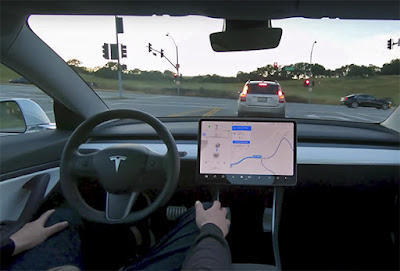Will he be able to rid the world of traffic jams and improve road safety?
Mumbai
Elon Musk announced plans to launch a Tesla-based robot taxi
During an investor report for Q1 2022, Tesla founder Elon Musk said his
company is working on creating an unmanned taxi. The entrepreneur is confident
the project will be in demand and commercially successful - Musk called the
new type of public transport one of the corporation's future growth engines.
The Tesla official assured that preparations for the launch of the project are
already underway, and the robot taxi will start operating in 2024. Thus, the
American automaker will have to decide on a concept in two years, create a
prototype, test unmanned vehicles, put them into production and resolve legal
issues. How many years must pass before robotic Teslas appear on city streets
is unknown.
Robot Taxi - Elon Musk's Dream
The discreet announcement of the new project came as no surprise to analysts.
At the opening of the Giga Texas plant in early April, Musk said his company
was working on "transportation of the future": "This is a special robot taxi
that will look pretty futuristic." At the end of the month, the entrepreneur
said that to launch the project, his company would need to develop a separate
car that was focused on fully autonomous driving. Thus, the car will not have
a steering wheel and pedals, but will receive additional seats for passengers.
Musk has repeatedly pointed out that Tesla's electric cars are not available
to most drivers. The current cost of Model 3 is 47 thousand dollars, Model Y -
63 thousand dollars. Robotic taxis will allow more consumers to get to know
the brand – the cars will cater to all passengers, not just those who can
afford an expensive electric car.
For investors, Musk clarified that entering a new market would allow the
company to make a lot of money. Tesla cars aren't fully autonomous right now,
and even the optional $12,000 Full Self-Driving software package isn't a true
autopilot. The entrepreneur is confident that autonomous taxis can bring in
much more profit than the proprietary autopilot system.
Autonomous taxis are already launched in many regions, but there are problems
Dozens of large companies and IT startups around the world are developing and
testing unmanned passenger transport vehicles. The US has Lyft, Waymo, Amazon,
China has Baidu, Didi, and Russia has Yandex. In March 2022, Waymo launched
test driverless electric cars on city roads and began testing cars
transporting its employees. Chinese Baidu's Apollo Go robot taxi service has
launched in some of the most populous cities in the world - Beijing, Guangzhou
and Shanghai.
Some of the issues preventing the launch of a full-featured driverless taxi
service have preoccupied players in the robot taxi market for more than a
year. Firstly, to serve passengers, the car must meet the maximum - fifth -
level of automated control. Second, driving on a test site and test track is
different from working in real conditions, where a car's artificial
intelligence must calculate a large number of probabilities and adapt to live
traffic participants. Third, unmanned vehicles, which are currently being
tested by participants in the robot taxi market, move with the help of
electricity. If thousands of taxis are needed in a big city, then where can
you get so many charging stations?
Another problem is related to the current situation in the world when, due to
the coronavirus pandemic and the economic crisis, supply chains are disrupted
and electronics production is stopped. Obviously, to launch a large number of
robotic taxis, it is necessary to mobilize chipmakers and other electronics,
which will be stuffed with drones. There is no doubt that the production of
autonomous machines at the initial stage will be on a small scale, while
suppliers of semiconductors and other components in shortage conditions will
give preference to orders from large IT giants that produce smartphones,
computers and electrical appliances.
Self-driving taxis have huge potential, self-driving cars can change people's lives
Futurologists and financiers have no doubt that robot taxis will be able to
change the world for the better. According to Ark Invest, an investment firm
that successfully predicted the explosive growth of Musk's stock in 2018, the
self-driving taxi business will be very profitable. Analyst Tasha Keaney said
that by 2026, more than half of Tesla's value will come from the robot taxi
segment.
According to the Ark Invest
report
for February 2020, the rapidly growing market can enrich drone manufacturers
and operators and improve the lives of passengers. Elon Musk promised that a
robot taxi would be cheaper than a bus or subway ticket. Analysts agree: they
estimate that, in an uncompetitive market, a trip will cost half a dollar a
mile. In a highly competitive environment, taxi companies charge 25 cents, or
around 20 rubles per mile, which is very cheap compared to traditional modes
of transport. The researchers found that, under these conditions, a regular
taxi ride costs ten times as much, and owning a car costs twice as much.
The release of large numbers of electric cars on the roads and the
availability of the service will encourage consumers to use less traditional
and personal transport, which will positively affect the environment. That
way, when a large number of drones appear, they can better build a route,
avoiding traffic jams and congestion. It is also in the interest of taxi
operators to automate trips as quickly as possible. Firstly, the probability
of having an accident in an unmanned vehicle of the highest level of autonomy
will be minimal - the autopilot does not exceed speed and is not distracted by
the phone. Second, according to Arthur D. Little, driver salaries are one of
the biggest operating costs of passenger transport services.

